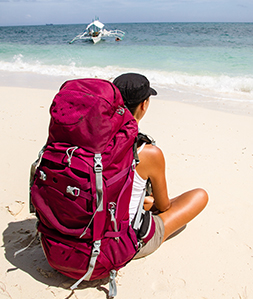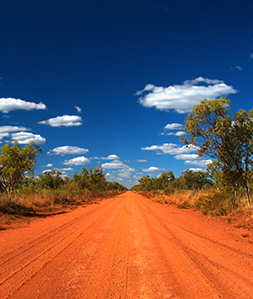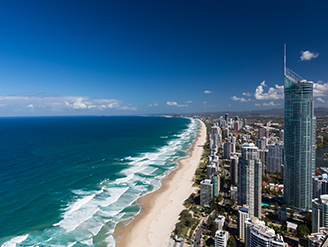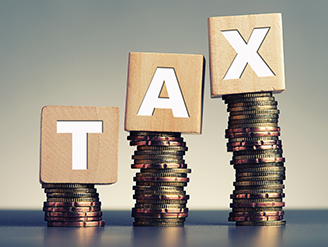Australia’s financial year runs from 30 June through to 31 July each year and with 31 July fast approaching many backpackers on working holidays in Australia are beginning to anticipate the tax return they will be entitled to. The Australian tax system is a complex process for many backpackers who come to Australia on a working holiday and some backpackers who have paid tax are not even aware that they are entitled to a tax refund. Its no wonder that backpackers on a working holiday in Australia have so many questions about how much tax they have to pay and also how much of a tax refund they will receive at the end of the financial year.

It is a fact that most backpackers on working holidays in Australia pay more tax than they should. One of the reasons for this is that tax is worked out on a sliding scale and with the expectation that workers will be employed full time over a full year. But as backpackers are on a working holiday they generally aren’t employed for a full year so the tax scale sees them paying additional tax than what they actually should for what they have earned. Let’s face it, what backpacker wants to come to Australia on a working holiday but skip the holiday component? The overwhelming response to this question would be – None!
At the end of the financial year, backpackers on working holidays in Australia are required to submit a tax return, just like Australian workers. There are even significant fines for backpackers on working holidays in Australia who fail to submit their tax return. While backpackers have this legislative reason for submitting their tax return, the main reason that backpackers submit their tax return is to ensure that they receive a tax refund. Every backpacker on a working holiday in Australia will have had tax withheld from their employment income. As they have paid tax on their earnings backpackers become eligible to claim a tax refund if they have paid to much tax, because they have incurred necessary employment expenses (like purchasing safety equipment, or undertaking work related training), and even because their employer has taxed them at a higher rate than they should have been taxed at.
Continue Reading
Australia’s financial year runs from 30 June through to 31 July each year and with 31 July fast approaching many backpackers on working holidays in Australia are beginning to anticipate the tax return they will be entitled to. The Australian tax system is a complex process for many backpackers who come to Australia on a working holiday and some backpackers who have paid tax are not even aware that they are entitled to a tax refund. Its no wonder that backpackers on a working holiday in Australia have so many questions about how much tax they have to pay and also how much of a tax refund they will receive at the end of the financial year.

It is a fact that most backpackers on working holidays in Australia pay more tax than they should. One of the reasons for this is that tax is worked out on a sliding scale and with the expectation that workers will be employed full time over a full year. But as backpackers are on a working holiday they generally aren’t employed for a full year so the tax scale sees them paying additional tax than what they actually should for what they have earned. Let’s face it, what backpacker wants to come to Australia on a working holiday but skip the holiday component? The overwhelming response to this question would be – None!
At the end of the financial year, backpackers on working holidays in Australia are required to submit a tax return, just like Australian workers. There are even significant fines for backpackers on working holidays in Australia who fail to submit their tax return. While backpackers have this legislative reason for submitting their tax return, the main reason that backpackers submit their tax return is to ensure that they receive a tax refund. Every backpacker on a working holiday in Australia will have had tax withheld from their employment income. As they have paid tax on their earnings backpackers become eligible to claim a tax refund if they have paid to much tax, because they have incurred necessary employment expenses (like purchasing safety equipment, or undertaking work related training), and even because their employer has taxed them at a higher rate than they should have been taxed at.
While backpackers on a working holiday are recommended to obtain expert advice from a tax agent on their tax affairs, we have listed the answers here to some common questions asked by backpackers on working holidays in Australia.
Do I need anything to apply for Tax Refund?
There are a number of things that backpackers on working holidays in Australia need before they file their tax return to obtain their tax refund. Firstly backpackers will need to have a copy of their Group Certificate. A Group Certificate is a document that is prepared by the backpackers employer that shows the income they have made, the tax they have paid and also any deductions that have been taken out of their wages. The Groupp Certificate will also show the period that the backpacker was employed.
Most backpackers work for various employers while they are on a working holiday in Australia so they will have a number of Group Certificates when it comes time to applying for their tax refund. It is important that backpackers on working holidays in Australia ensure that they receive a Group Certificate from all of their employers otherwise the details they have for preparing their tax return will be incomplete. This may lead to the backpacker getting a smaller tax refund than what they are actually entitled to.

How do I apply for my Tax Refund?
Backpackers on working holidays in Australia are able to apply for their tax refund themselves by using the online tax return system found on the web site of the Australian Tax Office. This is known as the E-Tax system.
While backpackers can apply for their tax refund on their own it is highly recommended that they use the services of a tax agent. A tax agent, especially one who specialises in taxation for backpackers on a working holiday in Australia has detailed knowledge of all the deductions and allowances that backpackers are entitled to when claiming their tax refund. By using a tax agent, backpackers on a working holiday in Australia can be assured that they will receive more money in their tax return. Tax agents have specialised knowledge of how backpackers on working holidays in Australia can legally minimise their tax.
The best thing about backpackers on a working holiday in Australia using a tax agent is that they don’t have to worry about filling in the tax return that has to be submitted to the Australian Tax Office so that the backpacker can receive their tax refund. Best of all, the fee charged by the tax agent is also a deductible expense from the tax that they have paid while they have been working. This makes using a tax agent to make sure that the backpacker claims all that they are entitled to a worthy expense that is ultimately deductible anyway. It’s a win win situation for the backpacker on a working holiday in Australia.
How Long Does it Take to Get My Tax Refund?
Generally it takes about 2 weeks for a backpacker on a working holiday in Australia to receive their tax refund. However, delays can be experienced if the tax return they have filled in is incomplete or incorrect. This gain highlights the importance of backpackers on working holidays in Australia in using a tax agent to file their tax return. By using a tax agent backpackers on working holidays in Australia can have the confidence that their tax return has been correctly so that they will receive their tax refund as soon as possible.
By using a tax agent, backpackers on a working holiday in Australia are also able to expedite the processing of their tax return. While having their tax agent expedite their tax return will cost a little more in professional fees its speeds up the process of receiving their tax refund sooner. This is a great option for backpackers on a working holiday in Australia who are experiencing a serious cash flow issue.

What employment expenses can I claim back for my tax refund?
There are so many expenses that backpackers on a working holiday in Australia can claim back as part of their tax return that it would be impossible to list them here. But some common workplace deductions that backpackers on a working holiday in Australia can claim are:
- Laundry expenses;
- Purchasing compulsory uniforms;
- Steel capped Safety Boots;
- Sunglasses for those backpackers who work outside;
- Sunscreen;
- Overtime meals for backpackers who work long hours;
- Stationary such as pens and paper that backpackers use while they are working;
- Protective clothing;
- Protective equipment such as mesh gloves for backpackers who may be employed in cutting fishes and meats;
- Hats;
- Training expenses such as completing the RSA for backpackers who work in bars and clubs;
- Travel expenses for backpackers who are required to travel between workplaces;
- Union membership
- Bank fees for bank accounts that backpackers have their income paid into

The list of what a backpacker can claim as a deduction for their tax refund is virtually endless so long as the expense was a necessary expense that they have incurred as part of their employment.
By using a tax agent who has specialised knowledge of all the deductions available to backpackers on a working holiday in Australia then backpackers can be assured that they will have claimed all thee deductions that they are entitled to. Backpackers should also ensure they keep receipts of all the costs they have incurred as part of their employment in Australia. Not only is it a legal requirement for backpackers to keep receipts so that they can justify the deductions they have claimed in their tax return it also assists the tax agent in its preparation.
The receipts that backpackers provide to their tax agent will assist the tax agent in knowing exactly what costs the backpacker has incurred. Often times, backpackers will forget some of their work related expenses and by providing a copy of their receipts to their tax agent backpackers can be confident nothing has been forgotten. Many backpackers buy a a plastic envelope that they keep all of their receipts in, not only is this a convenient way to store all of their receipts, it also ensures that their receipts are easily accessible for when they need them at tax time.
How do I receive my Tax Refund?
Backpackers will receive their tax refund into their nominated bank account. For this reason it is important that when the backpacker on a working holiday in Australia attends at their tax agents, that they take their bank account details with them. By backpackers ensuring that they provide their bank account details to their tax agent at the time of their initial appointment will make sure that the process of obtaining their tax refund is not delayed.
What happens if I haven’t kept any Receipts?
Unfortunately backpackers on a working holiday in Australia need to keep receipts as documentary evidence of the expenses they have incurred in the course of working in Australia. Without having their receipts, backpackers on working holidays in Australia will be prevented from claiming all of the deductions that they would otherwise be entitled to. There are a number of deductions that backpackers can claim without receipts so long as it does not exceed a certain threshold. Backpackers on a working holiday in Australia who have not kept their receipts should speak to their tax agent about what they can still claim for their tax refund. All is not lost; backpackers without receipts should still be entitled to a tax refund even if it is smaller than what it should be.
A tax refund is an important boost to the cash flow of any backpacker on a working holiday in Australia. While backpackers on a working holiday in Australia are entitled to apply for their own tax refund it is highly recommended that they use the services of a tax agent. By using a tax agent, backpackers on a working holiday in Australia can be assured of claiming all of the deductions that they are entitled to. A tax agent will also be able to identify if a backpacker on a working holiday has been taxed at a higher tax rate than they actually should have. All of these things mean more money back in the backpackers tax refund. While it may not exactly be Christmas, 01 July each year is an exciting time for many backpackers around Australia, as it’s the first day they can make an application for a tax refund.






































